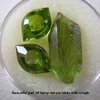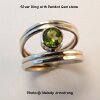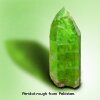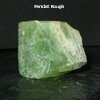 Peridot is believed to hfave got its name either from the Arabic word ?faridat? meaning gem or the French word peritot meaning unclear. Due to its green color, the green peridot gemstone is often referred to as the poor man's emerald. For three millennia, a small desolate and forbidden island in the Red sea has been exploited for these gemstone.
Peridot is believed to hfave got its name either from the Arabic word ?faridat? meaning gem or the French word peritot meaning unclear. Due to its green color, the green peridot gemstone is often referred to as the poor man's emerald. For three millennia, a small desolate and forbidden island in the Red sea has been exploited for these gemstone.
From ancient times people confused this gem with other gemstones. It was one of many mistaken for topaz. Some historians also believe that Cleopatra?s famous emerald collection might have actually been a collection of peridots.
From the port of Ras Banas in Egypt small boats are still used to cross the more than thirty miles of shark infested water to reach this island called Zabargad, Arabic for this deposits of mineral olivine (from which the gem material for peridot stones is obtained). The beaches near the deposit are green with tiny crystals. After going up the Peridotitie Hill through the ancient diggings, one can find the fissures lined with complete and fractured gem crystals measuring from some millimeters to several centimeters.
 Composition of Peridot
Composition of PeridotThe chemical composition of peridot gem stone is iron and magnesium silicate (Mg2 SiO4 ? Fe2 SiO4). Its specific gravity is 3.34 and its refractive index ranges between 1.654 and 1.690. Peridot is a very sensitive and soft stone, measuring 6.5 to 7 on the Mohs scale.
Peridot is one of the few gemstones that comes in only one color i.e. green. The depth of green depends on how much iron is contained in the crystal structure, and varies from yellow-green to olive to brownish green. Unlike other gemstones, iron is part of this gem?s chemical composition as well. Peridot owes its popularity to its attractive yellowish green hues (caused by iron) and to the fact that it is the most affordable untreated green gemstone. Due to it olive green color the gem is also called as olivine..
Peridot is usually cut and faceted in round and other fancy cuts like emerald cut, princess cut etc. Dome-shaped cabochon cuts are not very commonly used for this gem. Emerald cut peridot is also found in plenty because of its resemblance to emerald.
Carat
Mostly small sizes of 0.10 carat up to 3 carats of peridot are used abundantly in jewelry settings. However, the gem can also be found in huge sizes, like the 172.53 carat gem that was found in the mines of Pakistan.
Uusally eye clean peridots are found in plenty. The most typical inclusion in peridot gems are called ?lilypad? which is the presence of biotite grains. If the gem contains this inclusion, then one can be sure say that it is a peridot. The presence of this inclusion may even affect the price of the gem. Another interesting way to find out if the gem is peridot, is the doubling of the back facets seen when the gem is viewed from the top.
Peridot mineral being soft and sensitive gets scratched easily and requires to be handled with care. Peridots are not suitable for use in peridot jewelry like rings, which is subject to more wear and tear. It is best used in form of peridot earrings, peridot pendants, peridot bracelets etc.
Besides being soft this gem is also very sensitive to rapid changes in temperature. Dipping it in cold water after soldering can create cracks in the stone. Acids like hydrochloric and sulfuric can etch the gemstone?s surface and mar the polish. Good peridot care involves avoiding the gemstone to contact any acid and handling it with care.
 Price, Cost and Buying of Peridot Gemstone
Price, Cost and Buying of Peridot GemstoneThe most valuable natural fine quality peridots are green without any hint of yellow or brown. Small stones of commercial quality can cost $5 per carat and larger gems with a better color and fewer inclusions can command prices up to $30 per carat. Usually the price per carat does not increase with the increase in size of this gemstone.
 The finest and beautiful large sized peridot roughs are mined in Myanmar (formerly Burma) and, more recently it comes from a source high in the Himalayas in Pakistan. Commercial gem material comes mainly from Arizona, China, St. John Isle, Norway, Mexico and Hawaii.
The finest and beautiful large sized peridot roughs are mined in Myanmar (formerly Burma) and, more recently it comes from a source high in the Himalayas in Pakistan. Commercial gem material comes mainly from Arizona, China, St. John Isle, Norway, Mexico and Hawaii.
Peridot gems are very rarely treated. One can say they are almost never treated, as the production of the gem is enough to meet the demand in the market. If at all the gem is treated then it would be heat treated in order to enhance its color.
 Simulants of Peridot Gem
Simulants of Peridot GemSinhalite, green sapphire, chrysoberyl, diopside and synthetic spinel are some of the gemstone which can be easily confused with peridot.
Synthetic peridot has been manufactured in laboratories, but only for experiment purposes. This material closely resembles natural peridot and is not found in the commercial market for sale.
 Interesting Trivia and other peridot facts
Interesting Trivia and other peridot factsNatural peridot crystals are known to have been collected from iron-nickel meteorites. Peridot is the lucky birthstone for people born in the month of August. Hence Peridot is also called as august birthstone. Peridot birthstone is mainly used in form of peridot rings and pendants.
1) Webster
2) Gemmology by Peter G.Read
3) Handbook of Gem Identification - Richard T.Liddicoat, jr
4) Gems and Crystals - From the American Museum of Natural History - Anna S.Sofianides and George E.Harlow.
Home | Add URL | About Us | Contact Us | Links | Privacy Policy | Resources | Sitemap | Design by Paper Tree
Copyright 2007 GehnaBazaar.com. All rights reserved. The information contained in this webpage may not be published, broadcast, rewritten or redistributed without a prior written consent. Natural Gemstones | Precious Gemstones | Jewellery Designers | Jewelry Institutes | Jewelery Design Institutes | Gemstone Information | Diamond Information | Gemmological Laboratories | Gem Labs | Jewelry Articles | Gold Price | Jewel Store | Buy and Sell Jewellery | Jewery Classes | Deisgn classes | Gemologists | Diamond Price